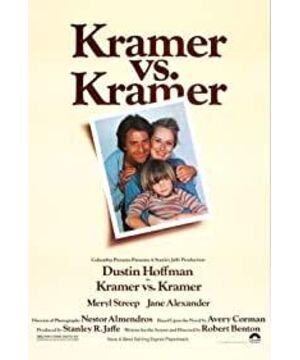As an ethical film reflecting the life of a middle-class family, "Mrs. and Mrs. Kramer" has won five awards, including the Oscar for best picture, which is really incredible. The trivialities of family life are nothing more than the prominence of divorce, and the plain and concise narrative shots run through, so why is it great? Perhaps it is because it captures the eternal motif of human beings - love, and by the way catches the ride of the times.
The story takes place in the late 1970s, and the background is clearly explained at the beginning of the film. The wife said goodnight to the child with a helpless look on her face, and then the camera cut to the husband who was working, forming a picture of a traditional family structure - the husband worked outside to support the family, and the wife handled the housework at home. Perhaps for some irreconcilable reason, the wife chose to leave, and the story unfolded slowly.
What's so special about the 1970s? Makes this marriage seem so unusual. The 1970s were truly extraordinary, especially for the United States. In the 1970s, the United States officially intervened in the Vietnam War, and a fierce anti-war movement was launched in the United States. People are disappointed with the government, people are pushed forward by noisy ideas. Ang Lee's "Ice Storm" showed a more explicit, stale and boring family life in that era. Everyone has a restless heart to break free, so there will be a community game of wife-swapping, and children who are not deep in the world are chasing sex. In that era, the concept of family fell apart, and individuals rushed in the direction of themselves. The story of the Kramer couple takes place in this social context, and this marriage bears the mark of the times.
Joanna's departure means the disintegration of the traditional family structure, breaking the balance between men and women, and a series of consequences follow. The gap between father and son, the imbalance between work and life hit Ted head-on, and how to resolve the dilemma of the family has become the key and the focus of the story. The conversation after Ted and Billy quarreled brought the issue to the fore. He explained to his son that the two separated because he always wanted Joanna to be a different person. When the other party tried to communicate, he chose closed. In court, the two fought tit-for-tat, and Joanna also mentioned that Ted used his job to exclude communication with her, and she felt only lonely and alienated in this relationship. The director put the management concept of marriage in front of the audience in a simple way, and the key lies in communication. When people overemphasize that the economic base determines the superstructure, they forget that the superstructure has a counter-productive effect, so Ted will just say: "I work hard outside for this family." This has also become a crack in the marriage. consistent pretext. The family is the most critical element of social composition, but individuals do not pay much attention to its management. Because of being busy with work and boosting personal aspirations, the divorce rate in the United States will remain high in the 1970s. The director tried to quiet Ted, and also asked the audience to think calmly, how to get along as a couple in an intimate interactive relationship? It should be on the premise of self-knowledge, mutual understanding, mutual compromise and tolerance based on the bond of love. So after self-reflection, Ted can grow into a skilled dad who balances life and work well.
In addition to the spiritual imbalance, there is also a material imbalance in this marriage. Joanna's departure is not only because of the gap in marriage, but also an attempt to find self-worth. Ted's unfamiliar and fractious handling of life's chores makes family relationships stand out. Men take the initiative in the family and are responsible for working to support the family, while women are fixed in the closed family life to manage the housework. In the process of realizing self-worth, men are forced to give up the pursuit of personal value and choose to live in the family. After Joanna fled, she was cured of her depression, earned more than her husband, and gained social approval, a break with traditional family stereotypes where women can even take the lead in the relationship. The director proposed a new type of family relationship, and how to balance it is left to you in front of the screen.
View more about Kramer vs. Kramer reviews











